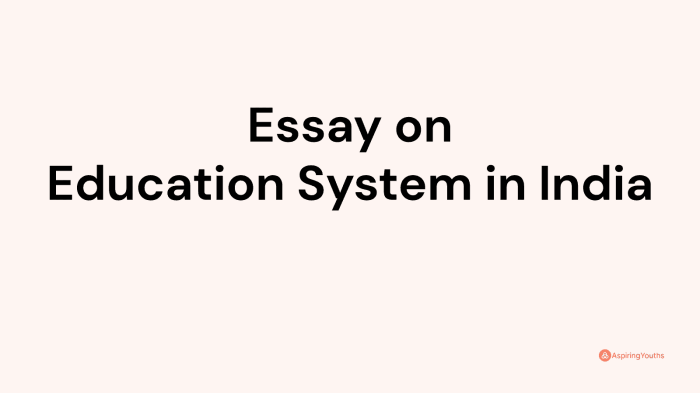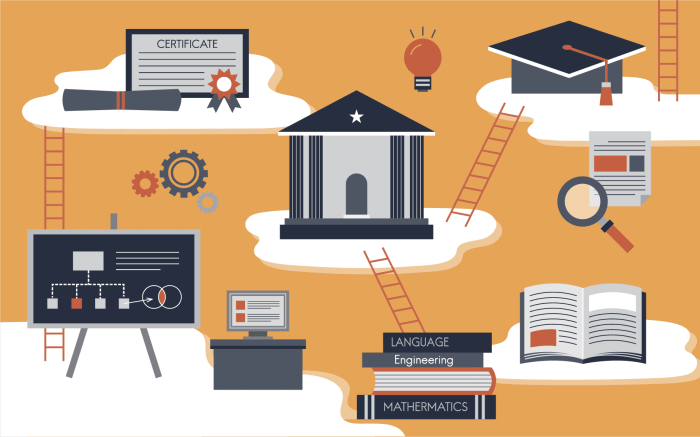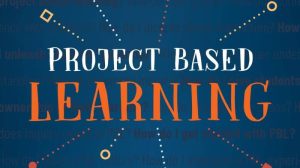
Education System Essay sets the stage for this enthralling narrative, offering readers a glimpse into a story that is rich in detail with casual formal language style and brimming with originality from the outset.
Education plays a crucial role in shaping societies, influencing individuals, and driving progress. This essay delves into various aspects of the education system, from its definition to its historical evolution and modern-day significance.
Education Definition

Education is the process of acquiring knowledge, skills, values, and habits through instruction, study, or experience. It is a fundamental right for every individual and plays a crucial role in personal development and societal progress.
Importance of Education in Society
Education is essential for the growth and development of individuals and society as a whole. It equips individuals with the necessary tools to navigate the complexities of the world, fosters critical thinking, and promotes social cohesion. Furthermore, education empowers individuals to make informed decisions, enhances economic opportunities, and contributes to the overall well-being of society.
Comparing and Contrasting Perspectives on Education
- Some view education as a means to acquire knowledge and skills necessary for employment and economic success.
- Others see education as a tool for personal growth, self-discovery, and fulfillment.
- There are also perspectives that emphasize the role of education in promoting social justice, equality, and democratic values.
Education Essay
Writing an education essay serves the purpose of exploring various aspects of the education system, analyzing educational theories, discussing the impact of education on society, or evaluating educational policies. It allows students to delve deeper into the field of education, develop critical thinking skills, and communicate their ideas effectively.
Structuring an Effective Education Essay
To structure an effective education essay, it is essential to start with a clear introduction that presents the topic and provides a thesis statement. The body paragraphs should present arguments supported by evidence and examples. Each paragraph should focus on a single point and transition smoothly to the next. Finally, the conclusion should summarize the main points and restate the thesis in a concise manner.
- Introduction: Introduce the topic, provide background information, and present a thesis statement.
- Body Paragraphs: Each paragraph should focus on a specific aspect of the topic, supported by evidence and examples.
- Conclusion: Summarize the main points, restate the thesis, and leave the reader with a thought-provoking conclusion.
Topics for an Education Essay
- The Impact of Technology on Education
- Educational Inequality and Access to Quality Education
- The Role of Teachers in Shaping Students’ Futures
- Evaluating Standardized Testing in Education
- The Importance of Early Childhood Education
Education Games
Educational games play a crucial role in the learning process, providing a fun and interactive way for students to engage with educational content. These games are designed to not only entertain but also to educate, making learning more enjoyable and effective.
Types of Educational Games
- Quiz Games: These games test students’ knowledge on various subjects through questions and answers.
- Puzzle Games: These games require problem-solving skills and critical thinking to progress through levels.
- Simulation Games: These games allow students to experience real-life scenarios and make decisions to see the outcomes.
- Language Learning Games: These games help students improve their language skills through vocabulary and grammar challenges.
Enhancing Cognitive Development
Educational games can enhance cognitive development in students by improving their problem-solving skills, critical thinking abilities, and decision-making processes. These games stimulate various areas of the brain, helping students to learn and retain information more effectively.
Education History

Education has a long and complex history that has evolved significantly over time. From informal gatherings in ancient civilizations to formalized systems in the modern era, education has played a crucial role in shaping societies and individuals around the world.
Ancient Education Systems
In ancient civilizations such as Mesopotamia, Egypt, Greece, and Rome, education was primarily reserved for the elite class. It focused on subjects like philosophy, mathematics, and literature, preparing individuals for leadership roles in society. Teachers were highly respected and often served as mentors to their students.
- Ancient Mesopotamia: One of the earliest known forms of education was the scribal school in Mesopotamia, where students were taught writing, mathematics, and literature.
- Ancient Greece: The Greeks introduced the concept of formal education in the form of academies like Plato’s Academy and Aristotle’s Lyceum, emphasizing critical thinking and philosophical inquiry.
- Ancient Rome: Roman education focused on rhetoric, oratory, and the art of persuasion, with students learning how to debate and present arguments effectively.
Medieval and Renaissance Education
During the Middle Ages, education was largely centered around religious institutions like monasteries and cathedral schools. The Renaissance period saw a revival of interest in classical learning, leading to the establishment of universities and a renewed focus on the arts and sciences.
- Medieval Education: Education in the Middle Ages was heavily influenced by the Church, with subjects like theology, Latin, and philosophy dominating the curriculum.
- Renaissance Education: The Renaissance brought about a shift towards humanism and a greater emphasis on individualism, creativity, and innovation in education.
Modern Education Systems
The Industrial Revolution of the 18th and 19th centuries transformed education by creating a need for a skilled workforce. This led to the rise of compulsory education laws, the development of public schools, and the diversification of educational opportunities.
- Compulsory Education: The implementation of compulsory education laws in various countries aimed to provide all children with access to basic education, regardless of their social or economic background.
- Public Education: The establishment of public schools made education more accessible to the general population, paving the way for universal literacy and numeracy.
- 21st Century Education: In the digital age, education has become more personalized and technology-driven, with online learning platforms, virtual classrooms, and interactive educational games shaping the way students learn and engage with content.
Education Film
Movies have long been a powerful medium to convey messages and provoke thoughts. When it comes to education, films play a significant role in portraying the challenges and triumphs of the education system. Let’s explore how popular films depict education and its impact on shaping perceptions.
Portrayal of Education in Popular Films
- Films often showcase the struggles of students and teachers in the education system, highlighting issues like bullying, academic pressure, and discrimination.
- Some movies focus on inspirational teachers who go above and beyond to make a difference in their students’ lives, emphasizing the positive impact educators can have.
- Others delve into the flaws of the system itself, shedding light on topics such as standardized testing, funding disparities, and curriculum limitations.
Impact of Educational Films
- Educational films have the power to influence public opinion and spark important conversations about the state of education.
- They can inspire viewers to advocate for change, whether it’s in policy-making, school environments, or individual teaching methods.
- By humanizing the experiences of students and teachers, films can create empathy and understanding, leading to a more informed and engaged society.
Education Banner
Banners play a significant role in educational settings as they serve as visual aids to convey important information, promote school events, celebrate achievements, and create a welcoming environment for students, teachers, and visitors.
Examples of Banners in Educational Institutions
- Banners displaying school values and mission statements help reinforce positive behavior and a sense of community among students and staff.
- Event banners announcing school plays, sports competitions, open houses, and other activities help generate interest and participation from the school community.
- Recognition banners celebrating student achievements, such as honor roll, sports accomplishments, and academic awards, boost student morale and encourage others to excel.
- Informational banners featuring educational quotes, motivational messages, and fun facts can inspire and engage students in the learning process.
Significance of Banners in Creating a Positive Learning Environment
Banners contribute to creating a positive learning environment by visually enhancing the school atmosphere, promoting school spirit, fostering a sense of belonging, and reinforcing core values and goals. They serve as constant reminders of the school’s mission and vision, helping to instill a sense of pride and motivation in students and staff alike.
Education Counselor

An education counselor plays a crucial role in schools or colleges by providing guidance and support to students in various aspects of their educational journey. They assist students in making academic choices, setting goals, and overcoming challenges to ensure their overall success.
Responsibilities of an Education Counselor
- Assessing students’ strengths, weaknesses, and interests to help them make informed decisions about their academic path.
- Providing academic and career guidance to students to help them explore different options and opportunities.
- Offering emotional support and counseling to students facing personal or academic difficulties.
- Developing individualized plans to address students’ specific needs and goals.
- Collaborating with teachers, parents, and other professionals to create a supportive environment for students.
Importance of Counseling in Education
Counseling plays a vital role in improving the overall education experience for students. It helps them navigate the challenges they may face in their academic journey and provides them with the necessary tools to succeed. By addressing students’ academic, emotional, and personal needs, education counselors contribute to creating a positive and supportive learning environment.
Education Degree
When it comes to pursuing a career in education, there are various types of education degrees available to choose from. Each degree offers unique benefits and opens up different career opportunities in the field of education.
Bachelor’s Degree in Education
A Bachelor’s degree in Education is typically the first step towards becoming a certified teacher. This degree provides a solid foundation in educational theory, classroom management, and teaching methods. Graduates with a Bachelor’s degree in Education can pursue careers as elementary, middle, or high school teachers.
Master’s Degree in Education
A Master’s degree in Education offers educators the opportunity to specialize in a particular area of education, such as curriculum development, educational leadership, or special education. This degree can lead to advanced teaching positions, school administration roles, or curriculum design opportunities.
Doctorate in Education (Ed.D. or Ph.D.)
A Doctorate in Education is the highest level of education degree in the field. This degree prepares educators for leadership roles in education, such as school superintendent, college professor, or education researcher. Doctoral degree holders often contribute to policy-making and educational reform initiatives.
Specialized Education Degrees
In addition to traditional education degrees, there are specialized degrees available in areas such as early childhood education, educational technology, and adult education. These degrees cater to specific interests and career goals within the field of education.
Benefits of Pursuing Different Education Degrees
- A Bachelor’s degree provides the foundational knowledge and skills needed to become a certified teacher.
- A Master’s degree allows educators to specialize and advance their careers in specific areas of education.
- A Doctorate in Education opens up opportunities for leadership roles and research in the field of education.
Career Opportunities Associated with Different Education Degrees
- With a Bachelor’s degree, graduates can pursue careers as elementary, middle, or high school teachers.
- Master’s degree holders can become curriculum specialists, school administrators, or educational consultants.
- Doctoral degree holders often work in academia as college professors, researchers, or policy-makers.
In conclusion, the Education System Essay sheds light on the multifaceted nature of education and its profound impact on society. It highlights the importance of continuous learning, the role of educational games, the influence of historical events, and the portrayal of education in films. Through this exploration, readers gain a deeper understanding of how education shapes our world and paves the way for a brighter future.
Questions and Answers
What is the role of educational games in the learning process?
Educational games help enhance cognitive development, improve problem-solving skills, and make learning more engaging for students.
Why is it important to understand the evolution of the education system?
Understanding the historical development of education systems provides insights into current practices, challenges, and opportunities for improvement.
How do educational films shape perceptions about education?
Educational films can influence how people view the education system, highlighting its challenges, successes, and impact on individuals and society.





